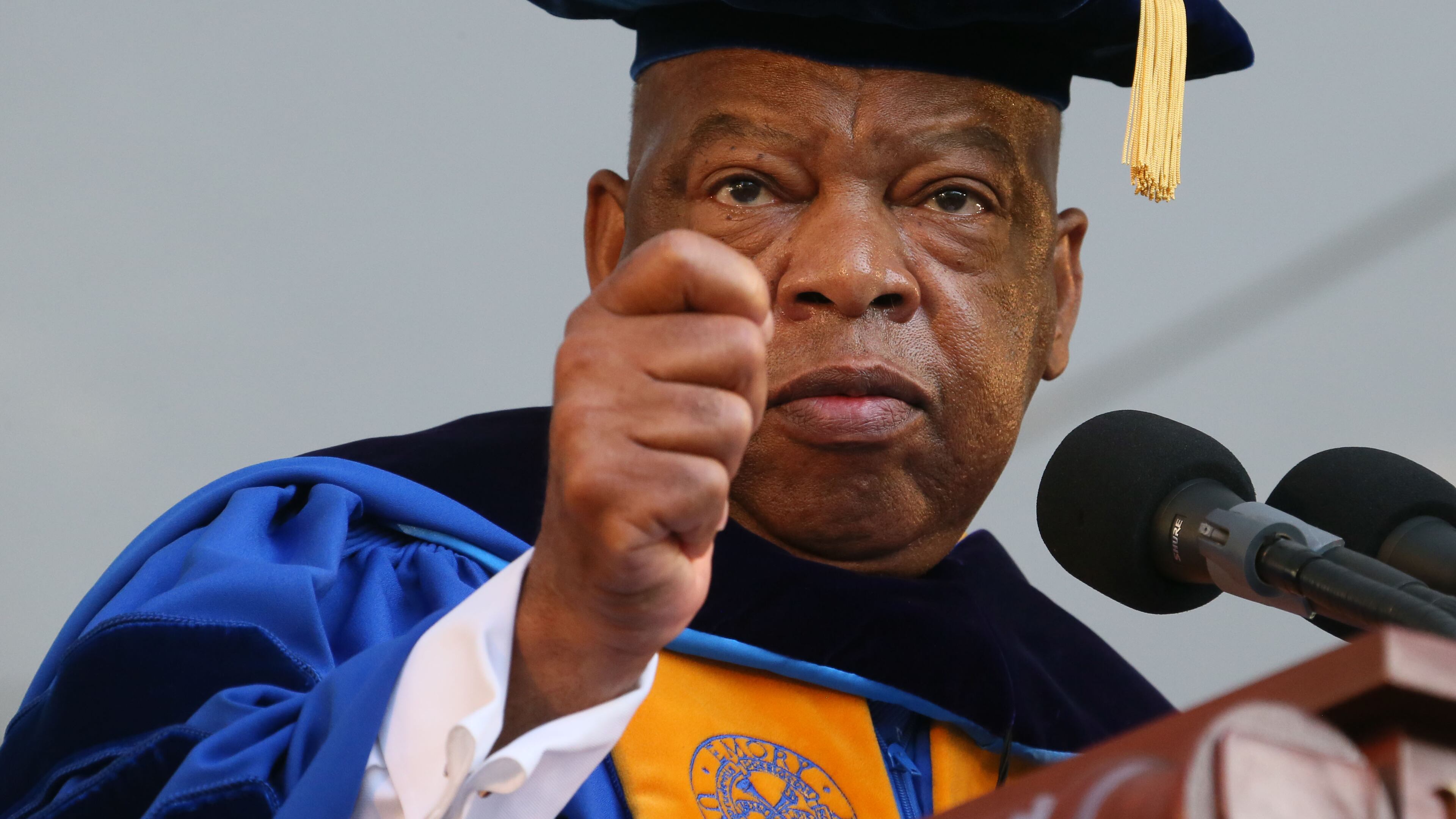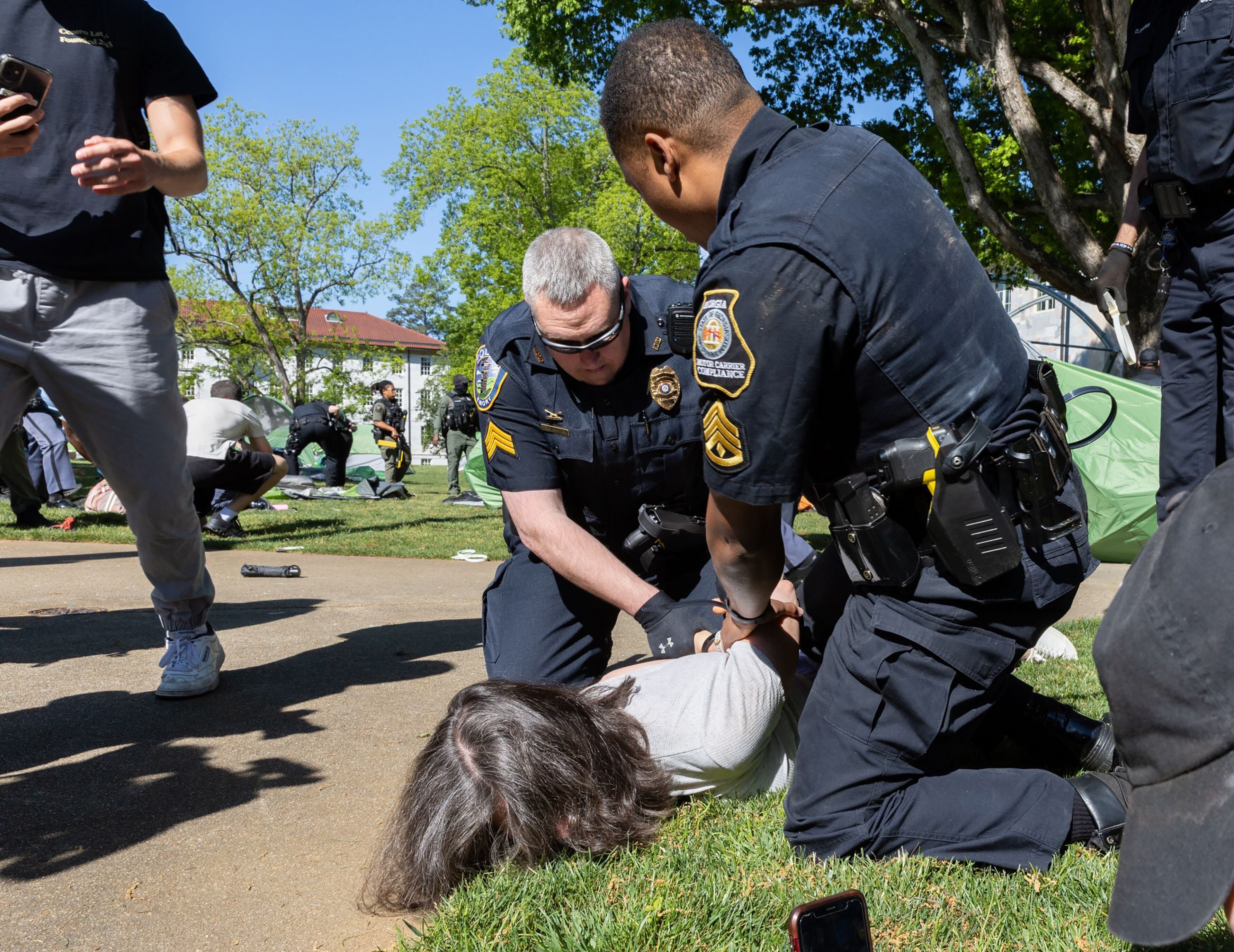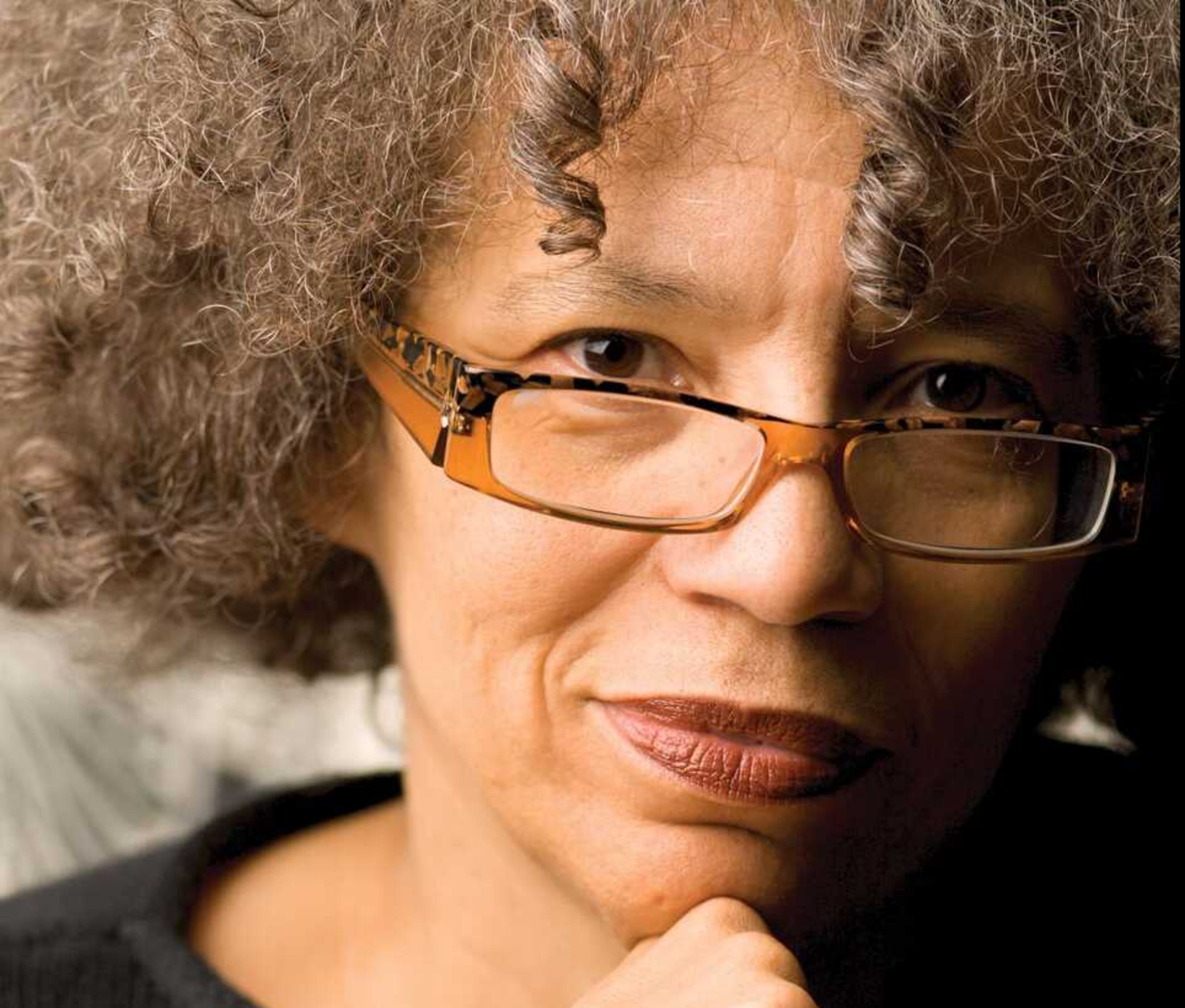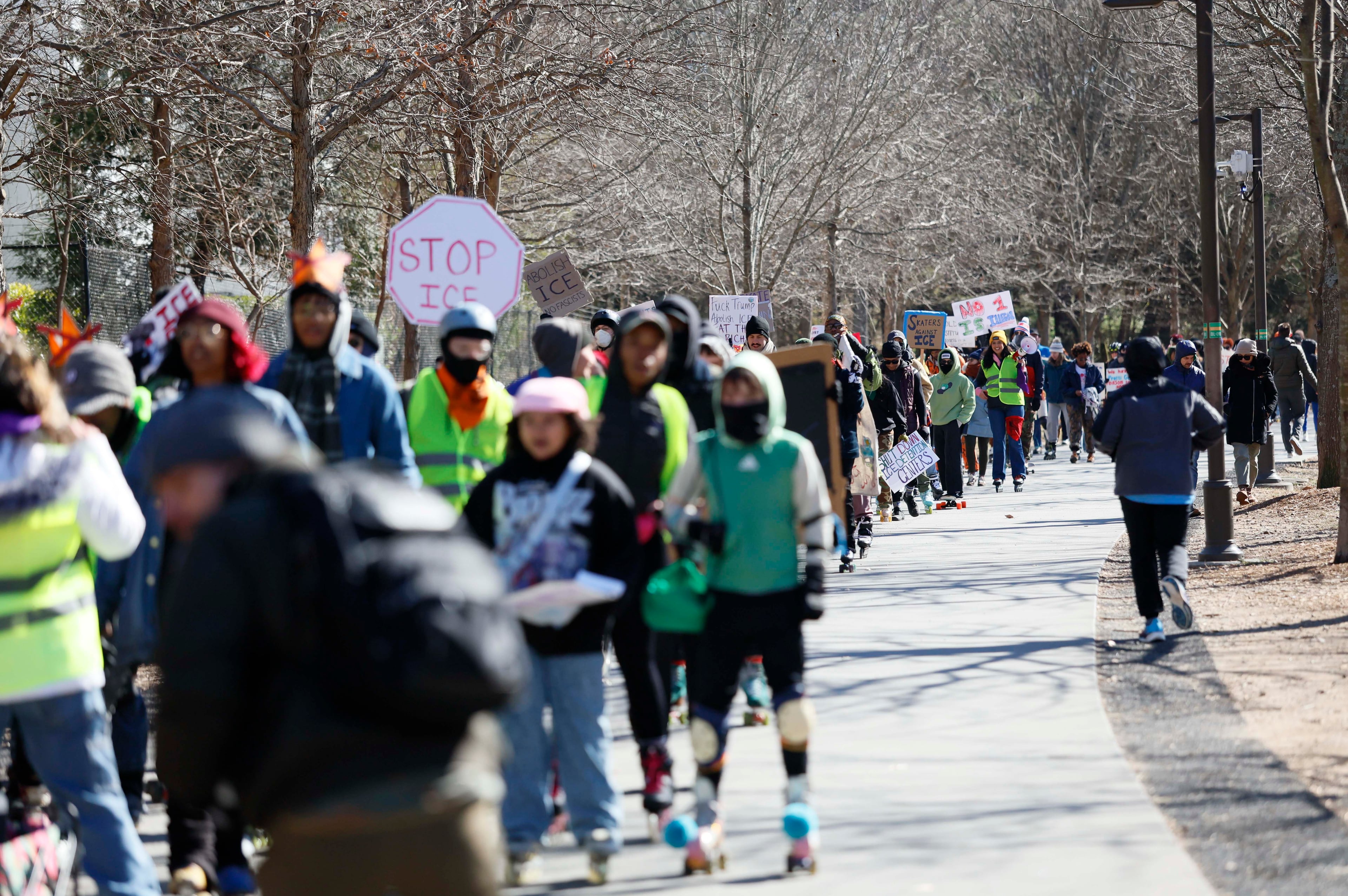John Lewis’ ‘good trouble’ message inspires Emory students amid protests

Most members of Emory University’s Class of 2024 were finishing the sixth grade a decade ago when Georgia congressman and icon of the Civil Rights Movement John Lewis gave the school’s commencement address on campus.
During his speech, Lewis recalled meeting Rosa Parks when he was 17 years old and the Rev. Martin Luther King Jr. the following year when he was 18.
“These two individuals inspired me to get in the way, to get in trouble,” he said. “So I come here to say to you this morning on this beautiful campus, with your great education: You must find a way to get in the way. You must find a way to get in trouble — good trouble, necessary trouble.”
That’s what some students say they did on April 25, when they set up an encampment on Emory’s quadrangle to show support for the Palestinian people and oppose the city of Atlanta’s planned public safety training center. Protesters like Emory student Bella Montealegre said the protest was peaceful, but 15 Emory students and a professor were arrested when police swept the area, using chemical irritants to disperse the crowd.
Watch U.S. Rep. and civil rights leader John Lewis’ address to Emory’s Class of 2014
“These liberal universities … say, ‘We love Atlanta because Atlanta is a civil rights city; it’s where Martin Luther King walked’ and now we’re (protesting) and they’re calling the police on us,” Montealegre said afterward. “We’re literally enacting the legacy of the city, enacting the legacy of the Civil Rights Movement.”
Maysam Elghazali, another Emory student involved in the protests, said Lewis’ message deeply resonates with her and other student protesters. (Lewis died in July 2020.)
“However, when it actually comes time to apply these principles of getting into ‘good trouble’ to acquire the necessary social justice that is absent from our societies, suddenly our administration draws a line ... now students have gone too far by causing a little disruption or inconvenience to bring attention to the active extermination of Palestinians,” she said.
As Emory holds its commencement Monday and students head home, some plan to continue to get into good trouble or find ways to address societal issues.
“I want to carry this effort as far and wide as I possibly can,” said Elghazali, who has returned home to Dallas for the summer. “This is becoming a globalized movement for liberation over oppression, and I’m going to see to it that our demands are met.”
Montealegre, who is graduating and returning to Orlando, Florida, also plans to stay involved in the protest movement. She’s not sure what that will look like yet, but thinks history will remember the pro-Palestinian movement positively, the way the Civil Rights Movement is viewed now.
“The Civil Rights Movement was super unpopular (at the time) and ... we now have the ability to look back at that situation and be like, ‘OK, yeah, (it was necessary),’ in the same way that we can look back at the Vietnam War and we can say, ‘Oh, yeah, that was abhorrent. That shouldn’t have happened,’” she said.
Pro-Palestinian protesters have organized marches and encampments on college campuses at other Georgia schools, such as the University of Georgia, and across the U.S., including Columbia University in New York, the University of California at Los Angeles and the University of North Carolina at Chapel Hill. For some Atlanta students, Emory’s response seemed to be especially out of touch, given its surroundings.
Samuel Livingston, an associate professor of Africana Studies at Morehouse College, says there are some similarities between the Civil Rights Movement of the 1960s and today’s pro-Palestinian movement.
“I think we really have to kind of step back and look at what the Civil Rights Movement was about with a different set of eyes,” Livingston said. “We tend to think it’s all about desegregating America’s buses and public facilities and schools, and that was definitely the case, but running throughout the Civil Rights Movement was also an anti-war agenda.”

He said some leaders of the time, such as Ella Baker, Modjeska Simkins, Septima Poinsette Clark and King, took strong anti-war stances. Although the anti-war sentiment may be similar six decades later, Livingston said, students’ worldviews have shifted.
“Many of these student activists just see the world where Israel, yes, can be a U.S. ally, but that doesn’t mean that the Palestinians have to be dispossessed of their life and their land and I think that’s what most of the students are responding to,” he said.
Beverly Guy-Sheftall is the director of the Women’s Research and Resource Center and Anna Julia Cooper Professor of Women’s Studies at Spelman College. She also attended Spelman during the Civil Rights Movement from 1962-66 and participated in peaceful protests. She said one difference between the movements is that the “elders” of the Civil Rights Movement, like King and Hosea Williams, went to college campuses to train students to demonstrate effectively.
“We were told that you could be arrested,” she said. “You had to make sure that you didn’t have anger management issues and if you (did), you probably should not participate.”
Lewis, a student at Fisk University, a historically Black school in Tennessee, was the chairman of the Student Nonviolent Coordinating Committee (SNCC) when Guy-Sheftall was at Spelman. The organization mobilized students to demonstrate by sitting at all-white lunch counters throughout the South. Guy-Sheftall participated in some sit-ins, but didn’t join SNCC.

Even though students protesting racism in the 1960s were often victims of hatred, Guy-Sheftall said she thinks pro-Palestinian demonstrators are facing a unique set of circumstances.
“They are really going against the grain,” she said. “They’re going against, in some instances, university policy about protesting ... and they certainly are going against the grain when calling for universities to divest from financial connections to Israel.”
Livingston said those kinds of demands show the students’ efforts aren’t frivolous.
“We actually have to look at the Civil Rights Movement as more than just a series of protests,” he said. “This was a way of thinking differently about the world, and if we’re serious about that, then we’ll get the most out of this present moment.”



